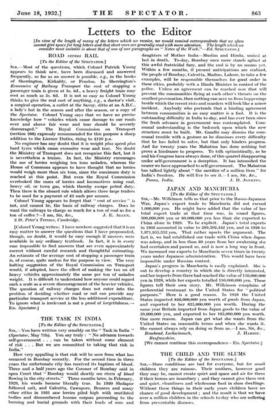Letters to the Editor
[In view of the length of many of the letters which we receive, we would remind correspondents that we often cannot give space for long letters and that short ones are generally read with more attention. The length which we consider most suitable is about that of one of our paragraphs on " News of the Week."—Ed. SPECTATOR.] ROAD versus RAIL [To the Editor of the SPECTATOR.] SIR,—Most of the questions, which Colonel Patrick Young appears to think new, have been discussed and answered frequently, so far as an answer is possible, e.g., in the books of Sherrington, Kirkaldy, or Tendon. In Sherrington's Economics of Railway Transport the cost of stopping a passenger train is given at 3s. 6d., a heavy freight train may cost as much as 5s. 6d. It is not so easy as Colonel Young thinks to give the real cost of anything, e.g., a doctor's visit, a surgical operation, a cutlet at the Savoy, ditto at an A.B.C., a lady's hat in the season and after the season, or a copy of the Spectator. Colonel Young says that we have no precise knowledge how " vehicles which cause damage to our roads over and above fair wear and tear should be severely discouraged." The Royal Commission on Transport (section 266) expressly recommended for this purpose a sharp addition to the Licence Duties, rising to £120 p.a.
No engineer has any doubt that it is weight plus speed plus hard tyres which cause excessive wear and tear. No doubt the Ministry of Transport does not recognize this fact, but it is nevertheless a truism. In fact, the Ministry encourages the use of lorries weighing ten tons unladen, whereas the House of Commons appears to have thought that no lorries would weigh more than six tons, since the maximum duty is reached at this point. But even the Royal Commission overlooked the cases of lorries and locomotives using coal, heavy oil, or town gas, which thereby escape petrol duty. Then there is the absurd rule which allows three large trailers to be used for a payment of £2 each per annum.
Colonel Young appears to forget that " cost of service " is not, and cannot be, the basis of railway charges. Does he want the railways to charge as much for a ton of coal as for a
ton of coffee 1.—T am, Sir, &c., J. E. ALLEN-. 2 St. Peter's Terrace, Cambridge.
[Colonel Young writes : I have nowhere suggested that it is an easy matter to answer the questions that I have propounded, though, no doubt, it would be easy enough if answers were available in any ordinary textbook. In fact, it is in every case impossible to find answers that are even approximately correct without careful research and thoughtful estimating. An estimate of the average cost of stopping a passenger train is, of course, quite useless for the purpose in view. The very halting suggestion of the Royal Commission on Transport would, if adopted, have the effect of making the tax on all heavy vehicles approximately the same per ton of unladen weight. It is difficult to understand how anyone could regard such a scale as a severe discouragement of the heavier vehicles. The question of railway charges does not enter into the problem of deciding whether road or rail can provide any particular transport service at the less additional expenditure. To ignore what is irrelevant is not a proof of forgetfulness.— En- Spectator.]








































 Previous page
Previous page